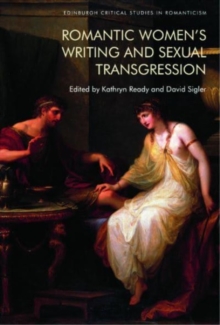
The Dissolution of Character in Late Romanticism, 1820 - 1839 Hardback
by Jonas Cope
Part of the Edinburgh Critical Studies in Romanticism series
Hardback
Description
Restructures and revitalises late Romantic literature as a movement fascinated with competing claims about the reality and knowability of characterThe idea of character that many of us still take for granted whether considered in print as an object of representation, or in life as a congenital 'bias' or an acquirable moral possession is the shared concern of a multidisciplinary debate in reform-era Britain.
This book argues for the independent merits of several lesser-known works written in England and Scotland during the 1820s and 1830s, recovering in these works a sustained ideological engagement with the ever-slippery concept of character. 'The Dissolution of Character in Late Romanticism' studies texts written by contemporary poets, novelists, essayists, journalists, philosophers, phrenologists, sociologists, gossip-mongers and anonymous correspondents.
Its main authors of interest include David Hume, Walter Scott, Charles Lamb, William Hazlitt, Hartley Coleridge, Letitia Landon, Thomas Love Peacock and Thomas Lovell Beddoes.With a fresh, interdisciplinary approach, this original intervention in Romantic-era scholarship throws character into relief as an especially problematic concept, not only for the poststructuralist critics who study late Romantic writers, but also for the writers themselves.
It changes the ways in which literary scholarship has thought about the development of character discourse in the first half of the nineteenth century.Key FeaturesDescribes a synthesis by which debates in many disciplines (novel-writing, periodical-writing, philosophy, phrenology, sociology, medicine, ethics) are distilled into the concept of character associated with literary realismMoves a relatively eclectic group of writers to the forefront of a literary culture traditionally narrowed to focus on Lord Byron, Percy Shelley, John Keats and their legaciesEstablishes a more comprehensive understanding of late Romantic literary networks by pairing authors rarely studied together (such as William Hazlitt and Letitia Landon)
Information
-
Available to Order - This title is available to order, with delivery expected within 2 weeks
- Format:Hardback
- Pages:256 pages, 2 B/W illustrations
- Publisher:Edinburgh University Press
- Publication Date:31/05/2018
- Category:
- ISBN:9781474421300
Other Formats
- EPUB from £53.13
- Paperback / softback from £21.19
Information
-
Available to Order - This title is available to order, with delivery expected within 2 weeks
- Format:Hardback
- Pages:256 pages, 2 B/W illustrations
- Publisher:Edinburgh University Press
- Publication Date:31/05/2018
- Category:
- ISBN:9781474421300










